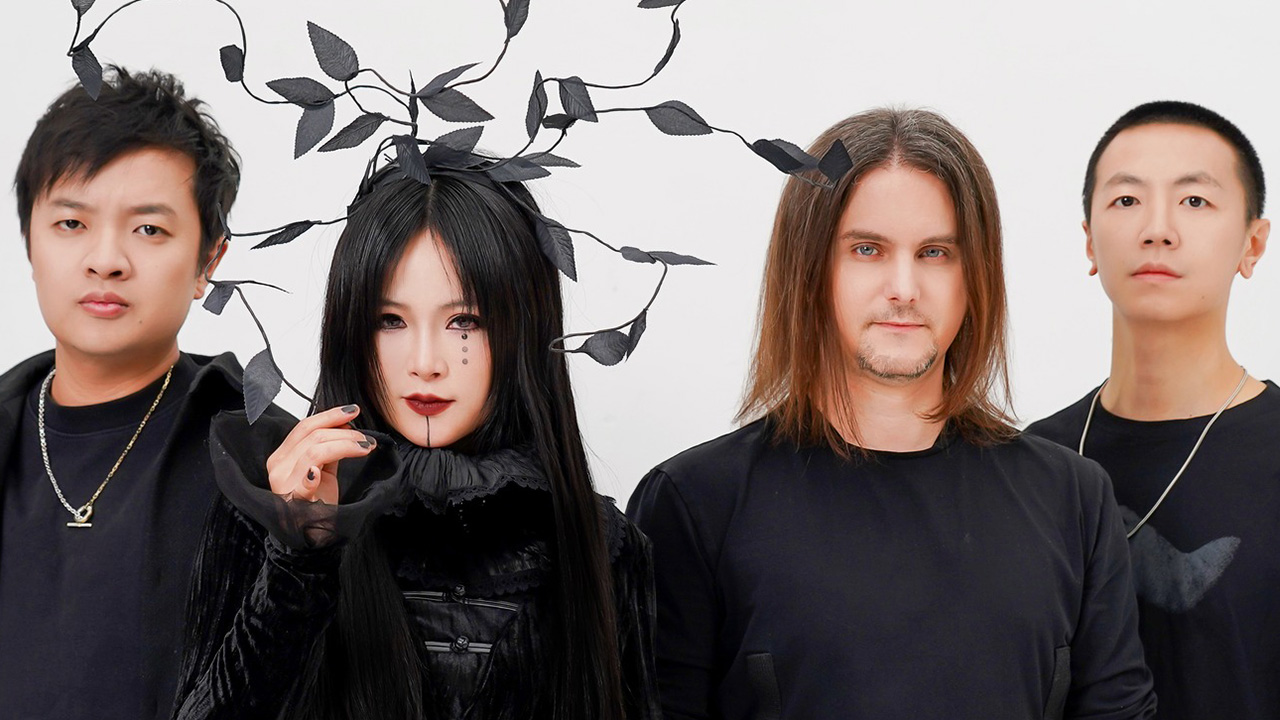
OU – pronounced ‘Oh’ – have made some impressive moves since forming in 2019. The first of those was founder Anthony Vanacore’s move from New York to Beijing; the next was signing to InsideOut Music; and the latest was landing Devin Townsend to produce second album II: Frailty. But, as Vanacore tells Prog, he believes the quartet are only just getting started.
Anthony Vanacore was only supposed to be away for a few weeks. After finishing his studies of music at Queens College, New York, in 2010, the American drummer joined an orchestra for a tour of China. He enjoyed it so much that he did it again the following year. Upon his second return home from the Far East, he realised something: it didn’t feel like home any more.
“When I came back to Flushing, Queens, I gained a new perspective on where I was living,” he tells Prog from Beijing. “I became more and more fascinated and very passionate about learning Chinese. It’s hard to describe, but there’s a resilience about the people here – there’s a spirit that really moved me.”
It’s 12 years since he emigrated, and Vanacore hasn’t just settled into a new country; he’s also the cornerstone of one of that country’s premier progressive bands. He co-founded OU with guitarist Jing Zhang and bassist Chris Cu in 2019. Rounded out by vocalist Lynn Wu, they quickly inked a deal with InsideOut Music – home of Dream Theater, Leprous, Caligula’s Horse and others – becoming the first Chinese prog act to sign with a major western label. Their first album, aptly titled One, arrived in 2022.
It was a labyrinthine mixture of jazz, folk and metal. Wu crooned ethereal melodies over the musicians’ dense, polyrhythmic work, anchored around Vanacore’s virtuoso playing, the blissful vocals standing in stark contrast to the flurrying instrumentation. It made the quartet one of the few progressive metal prospects to sound truly unique in the genre’s modern landscape.
Less than two years later, OU have returned with II: Frailty, and their distinct sound has found one helluva champion: it was produced and mixed by prog polymath Devin Townsend, who even lends his voice to the single Purge, his howls laying down a powerful backdrop to Wu’s more delicate singing.
“Devin is one of the sweetest guys I’ve ever met,” Vanacore says. “Really caring, really thoughtful; he just puts his all into it. He’d just come off a tour, he had jet lag and he was sick – but he wanted to jump right in. He was so passionate! Even though it wasn’t his own music, he treated it like it was. He put that amount of care into it, which meant the world to me.”
As a result, II: Frailty bears Townsend’s signature ‘wall of sound’ production style. OU’s instrumentation and nuance burst from the speakers throughout the nine-song set, bridging gaps between metal, jazz and gorgeous Chinese folk. Vanacore has trouble describing the Wu’s lyrics, but says they relate to themes of Buddhism and existentialism. Musically, though, he describes the new songs as tighter than those heard on One.
“There were a few songs on the first album that had the more standard verse-chorus- verse-chorus kind of thing, but a lot of them also had more open structures,” he says. “For the second album, a lot of the songs ended up being more traditional. It wasn’t intentional; the songs are more streamlined than the first album.”
There’s no questioning II: Frailty’s progressive credentials; even a cursory listen to the scrambling drums and bass of Ocean or Frailty’s pop-gone-arrhythmic verses will attest to that. That’s because heavy, forward-thinking music, in Vanacore’s own words, “changed my life forever.”
I remember sitting in class, not being able to think of anything except the guitar solo of Metallica’s Blackened
Born in New York City, he soon moved with his family about half an hour down the road to New Jersey. “As a kid, I fucked around and wasted tons of time,” he remembers. “I wasn’t really good at the whole school thing – but music saved my life. I’m definitely more introverted and I’ve always had self-confidence issues, but music gave me a bit of confidence: ‘Wow, I love it and I’m okay at it!’”
The turning point of Vanacore’s life came around the age of 9, when he received a copy of Metallica’s fourth album, ...And Justice For All – widely regarded as the band’s most experimental outing. “I remember sitting in class in fifth grade and not being able to think of anything except the guitar solo of Blackened,” he says. “As soon as the school bell rang, I ran home and sat my ass down in front of the stereo. I listened for hours.”
His tastes quickly broadened from there, encompassing everything from fellow metal aggressors Megadeth and Faith No More to the icons of jazz, primarily Allan Holdsworth and Herbie Hancock. His passion grew to the point that he studied music in higher education, pursuing classical as an undergrad and then jazz at postgrad school. Shortly after that an old friend, who played the flute, offered him the chance of drumming in her orchestra, leading to thise those three life-changing weeks in China.
When Vanacore moved to China in 2012, he settled in the city of Hangzhou, a short distance from Shanghai. “I was there for about three years,” he says. “It was a great experience because I had no English-speaking friends. I was forced to speak Chinese, so my Chinese really started to skyrocket.”
But Hangzhou offered little in the way of a music scene; so he made the 13-hour drive north to Beijing, where he’d remained ever since. “It’s probably the most fertile music scene in the country. You have a lot of underground music, a lot of experimental stuff, and everything else: pop, jazz, rock, metal. There are quite a few venues.”
Vanacore encountered Zhang and Cui when he joined them in a Beijing jazz fusion band. When he started writing what would form OU’s debut album, he asked them to be part of it. Wu came via the recommendation of one of Vanacore’s music students.
We had no lyrics, so she had to vocalise over the melody line… I had no idea it was going to go so well
“We met her in 2019,” he says. “We had four songs that were already recorded and just needed vocals. The first time she came in, they had no lyrics, so she had to vocalise over the melody line. I was completely mind-blown! I had no idea it was going to go so well. Some of those lines were extremely hard, but she killed it.”
Five years on, OU are one of the leading lights in Chinese progressive music, and they don’t have any plans to take their collective foot off the accelerator. The band are already planning album three, plus a video series inspired by their music.
“We’re on a three-album contract with InsideOut Music,” Vanacore says, “and there’s going to be some singles – one of them is already written. And we obviously want to tour at some point, probably 2025. There’s a cool animated series, which is almost completed, about this entity called OU. So even though we’re on our second album, I’d say this is a band that’s still in its infancy.”







